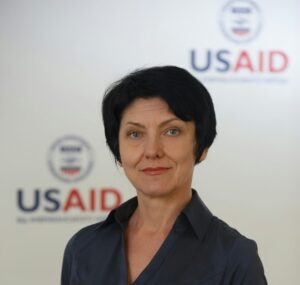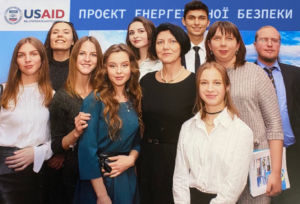Blog by Yulia Galustian, the USAID Energy Security Project Gender Expert

On August 12, Ukraine and the rest of the world celebrate International Youth Day to emphasize the potential of young people as equal partners in today’s global society. This year’s Youth Day is held under the slogan “Green Skills for Youth: Towards a Sustainable World.” Green skills include the knowledge, abilities, values, and attitudes that are essential for modern life, development, and maintenance of a sustainable and resource-efficient society.
Despite the emphasis on the relevance of green skills, available data show a lack of such skills among young people. The results of a comprehensive study to identify gaps between the needs and current educational opportunities in the energy sector, conducted by the Municipal Development Institute with the support of the USAID Energy Security Project (ESP), show that even though one-third of the managers of renewable energy sources (RES) companies assessed the professional training of young specialists employed by their company as fully meeting their needs, most employers point to the extremely important need to improve training of young RES specialists.
The full-scale russia’s invasion of Ukraine has posed many challenges for young people, including acquiring new knowledge and competencies necessary for the country’s recovery and reconstruction, including of its energy sector.
Young people play an important role in maintaining and developing Ukraine’s energy sector in this difficult time for the country. There are many arguments supporting the fact that the future of the country’s energy sector depends on the participation of young people, including:
- They are a key source of innovation and create startups that improve the stability, efficiency, and environmental friendliness of the energy system;
- Young people contribute fresh ideas and technologies that can change the traditional energy landscape;
- Young people are actively engaged in research and development in the field of renewable energy, solar panels, wind turbines, energy storage, and energy-efficient technologies; and
- They are promoters of energy efficiency and renewable energy sources, thus raising public awareness of energy consumption.
That is why the USAID Energy Security Project (ESP) engages young people on activities that promote the country’s energy sector development.
How does USAID ESP encourage young people to choose the energy sector?
Responding to the sector’s needs, USAID ESP supported the initiative “Young Energy – New Skills for Future Energy Professionals” proposed by the NGO “Stan.” Its goal was to equip young professionals and students with the skills necessary for successful employment in the energy sector. The initiative covered the entire country, and nearly 500 young people received new knowledge and practical advice for professional growth in the energy sector.
A map of energy professions and a 10-episode online course, “Career in Energy Sector is Cool,” were developed within the framework of USAID ESP’s cooperation with the Center for CSR Development. More than 14 thousand future power engineers have viewed the course! The project also successfully cooperated with universities, thus encouraging young people to choose energy professions.
It’s important for young people to learn about sustainable development and energy efficiency. When young people are educated about the problems associated with energy consumption and production, they can develop innovative solutions to improve the sector and change their own actions and behavior concerning energy consumption.

Energy education involves several aspects. First and foremost, vocational education enables young people to choose specialized educational programs at universities/institutes or colleges, gaining knowledge of energy technologies, energy management, renewable energy, energy efficiency, and other related fields. Students learn about the principles of different types of energy systems and skills needed to solve energy problems. USAID ESP supported the development of such educational programs for the Ivano-Frankivsk National Technical University of Oil and Gas. Their bachelor’s degree program in renewable energy currently has 37 students. The students study grid integration, renewable energy auctions, and least-cost planning.
USAID ESP’s ongoing cooperation with the Pryazovskyi State Technical University has also borne fruit. Students studying energy security at the second educational qualification level received teaching materials for Electric Power Engineering, Electrical Engineering, and Electromechanics specialties. In addition to theoretical education, future professionals are involved in practical classes, project development, and energy-related research. This allows young people to gain experience and apply their knowledge in real situations.
In addition, with the support of USAID ESP, the National University of Bioresources, Life and Environmental Sciences of Ukraine has opened a measuring and testing electrical laboratory with modern equipment for testing electrical installations. This allows students to master practical skills by working on various electrical power systems. Here, future power engineers have ample opportunities for research and can take advantage of new and modernized courses in disciplines related to the electricity sector.
Looking to the future
Summarizing the results of the USAID Energy Security Project’s work with youth over the past five years, we can proudly state that we have assisted civil society and educational organizations in implementing their energy projects and encouraged many students to link their professional future to the energy sector.
Young people are focused on an environmentally sustainable and innovative approach to energy production and consumption, reducing the use of fossil fuels. Their involvement in the energy sector can significantly contribute to the country’s sustainable development and energy independence.
